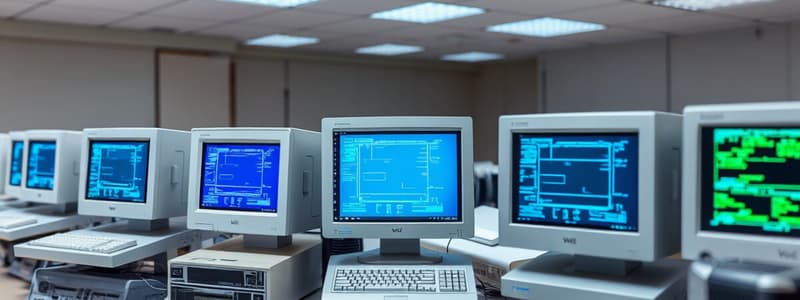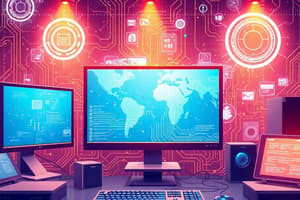Podcast
Questions and Answers
What was the first commercially produced digital computer?
What was the first commercially produced digital computer?
- ENIAC
- UNIVAC (correct)
- Apple I
- IBM 701
Which component is NOT associated with the first generation of computers?
Which component is NOT associated with the first generation of computers?
- Microprocessors (correct)
- Transistors (correct)
- Vacuum Tubes
- Integrated Circuits (correct)
Which president was the first to try the UNIVAC?
Which president was the first to try the UNIVAC?
- John F. Kennedy
- Richard Nixon
- Harry Truman
- Dwight Eisenhower (correct)
What technology is associated with the 5th generation of computers?
What technology is associated with the 5th generation of computers?
What is NOT a trend in ICT as mentioned in the content?
What is NOT a trend in ICT as mentioned in the content?
What does the term ‘data’ refer to?
What does the term ‘data’ refer to?
Which of the following is an example of assistive technology?
Which of the following is an example of assistive technology?
Which of these components is classified as output hardware?
Which of these components is classified as output hardware?
What is the main role of system software?
What is the main role of system software?
Which of the following is NOT classified as a type of personal operating system?
Which of the following is NOT classified as a type of personal operating system?
What does the machine cycle in a computer processor consist of?
What does the machine cycle in a computer processor consist of?
What is the purpose of a device driver within the operating system?
What is the purpose of a device driver within the operating system?
Which characteristic best describes embedded operating systems?
Which characteristic best describes embedded operating systems?
Clock speed of a CPU is significant because it determines what aspect of the processor's capability?
Clock speed of a CPU is significant because it determines what aspect of the processor's capability?
Which type of operating system is specifically designed to handle network management?
Which type of operating system is specifically designed to handle network management?
How does application software differ from system software?
How does application software differ from system software?
What is the primary function of ICT?
What is the primary function of ICT?
Which of the following statements about the abacus is correct?
Which of the following statements about the abacus is correct?
Who is known for conceptualizing the first programmable mechanical computer?
Who is known for conceptualizing the first programmable mechanical computer?
What was a major reason for the cancellation of Babbage's project?
What was a major reason for the cancellation of Babbage's project?
What does the acronym ENIAC stand for?
What does the acronym ENIAC stand for?
Which of the following best defines information?
Which of the following best defines information?
Which of the following technologies is NOT commonly included in ICT?
Which of the following technologies is NOT commonly included in ICT?
What is a characteristic feature of technology in the context of information dissemination?
What is a characteristic feature of technology in the context of information dissemination?
Flashcards are hidden until you start studying
Study Notes
Introduction to ICT
- Information: Processed data that leads to knowledge.
- Communication: Method of transmitting knowledge.
- Technology: Tools that enhance information and communication dissemination.
- ICT: Involves various technologies like mobile phones, computers, and the Internet for processing and managing data.
History of Computers
- Abacus: Considered the first calculator, used for hundreds of years.
- Charles Babbage: Conceptualized the first programmable mechanical computer in the 19th century, but it was never built due to complexity and funding issues.
- ENIAC: Developed in 1943, recognized as the first electronic computer, using electrical switches to store numbers.
- UNIVAC: Launched in 1951 as the first commercially produced digital computer; Dwight Eisenhower was the first president to use it.
Generations of Computers
- 1st Generation: Utilized vacuum tubes for circuitry.
- 2nd Generation: Involved transistors, making computers more reliable.
- 3rd Generation: Used integrated circuits for improved performance.
- 4th Generation: Featured microprocessors, further enhancing computing power.
- 5th Generation: Incorporates artificial intelligence, enabling machines to mimic human capabilities.
Trends in ICT
- Digital Transformation: Integration of digital technology in business operations.
- Digital Healthcare: Use of technology to improve healthcare services.
- Mobile Payments: Financial transactions conducted via mobile devices.
- Network Connectivity: Advancements in 5G technology and the Internet of Things (IoT).
Computer Fundamentals
- Computer: An electronic device that receives, processes, stores data, and produces output.
- Data: Raw, unprocessed facts, including text, numbers, and multimedia components.
- Hardware: Includes input devices (keyboard), output devices (monitor), and storage (flash drives).
- Software: Divided into application software (specific tasks) and system software (operating systems).
Operating Systems
- Operating System: Essential software for running the computer, including utility programs.
- Device Driver: Enables the OS to interact with hardware components.
- Central Processing Unit (CPU): The main chip that processes data and performs operations.
Types of Operating Systems
- Personal/desktop OS: Installed on single-user computers (e.g., Mac OS, Linux, Windows).
- Mobile OS: Designed for handheld devices.
- Server OS: Manages networks between linked computers.
- Embedded OS: Operates within specific devices like ATMs and media players.
Additional Concepts
- Clock Speed: The rate at which a CPU executes instructions, measured in instructions per second.
- Registers: Small memory spaces used by the Arithmetic Logic Unit (ALU) for calculations.
- Machine Cycle: The sequence of steps executed by a computer's processor for machine language instructions.
- Boot Process: A series of steps to start a computer and load the operating system.
Studying That Suits You
Use AI to generate personalized quizzes and flashcards to suit your learning preferences.




